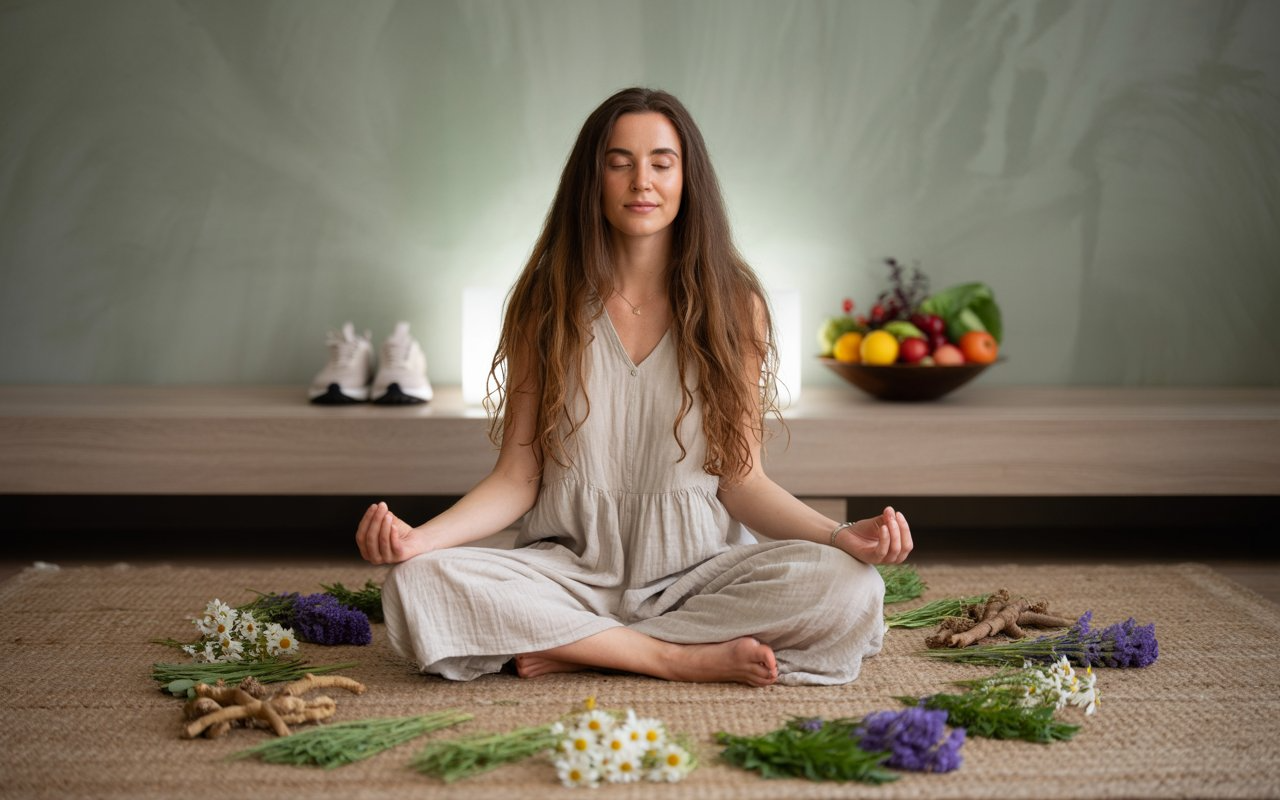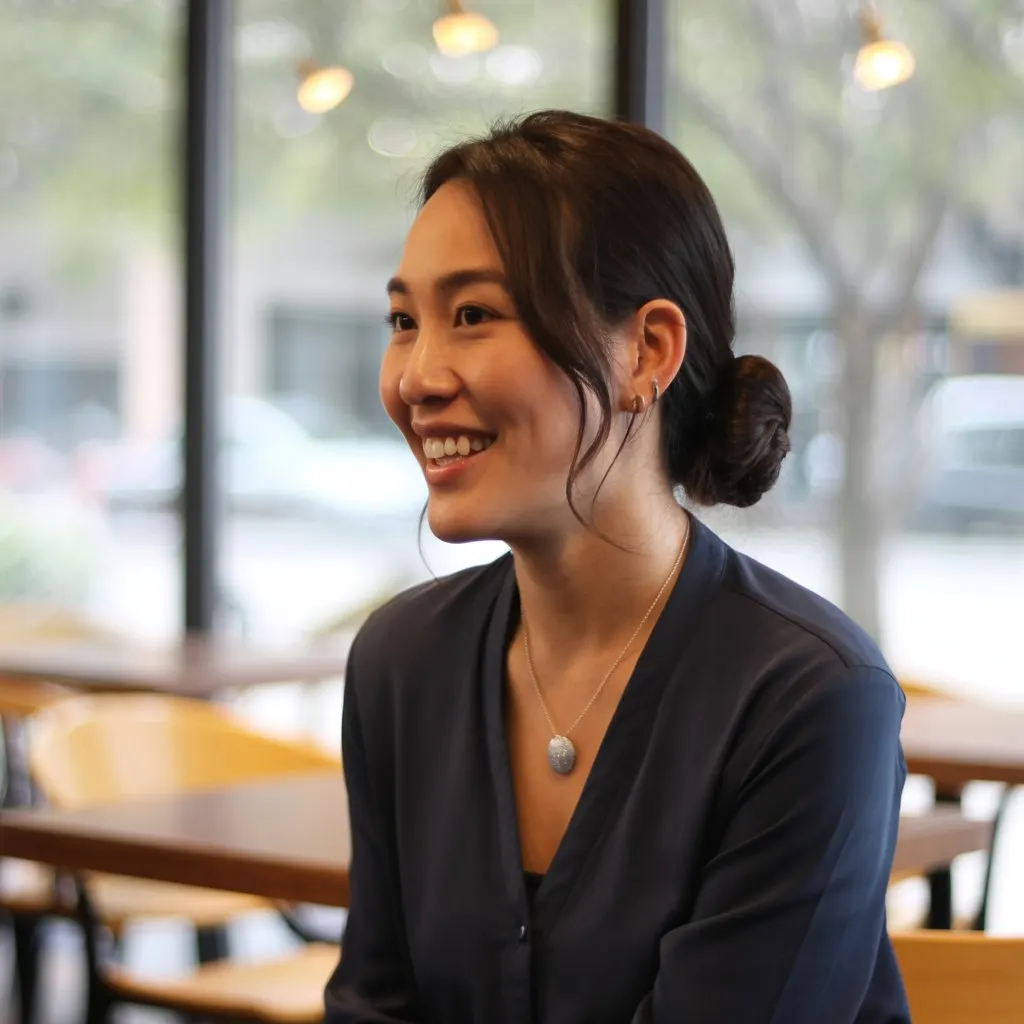I was standing in the supplement aisle of my local health store last week, watching a young woman read every label with the kind of desperate intensity I recognized all too well. She looked like I did fifteen years ago—searching for anything that might quiet the constant hum of worry that had become her unwelcome companion. When she asked me if I knew anything about natural remedies for anxiety, I couldn’t help but share what I’ve learned through my own journey with General Anxiety Disorder and years of helping others find their path to peace.
Here’s what I’ve come to understand: while natural remedies for General Anxiety Disorder aren’t magic bullets, they can be powerful allies in your healing journey. When I first started exploring alternatives to medication—not because medication is wrong, but because I wanted to understand all my options—I discovered that God has provided us with remarkable tools in nature and lifestyle practices that can genuinely support our mental health.
Let me walk you through what I’ve learned works, what the science says, and how faith can weave beautifully through it all.
Understanding GAD and the Natural Approach
General Anxiety Disorder isn’t just occasional worry—it’s that persistent, nagging anxiety that shows up uninvited to every part of your life. I remember describing it to my counselor as having a smoke alarm that goes off when someone burns toast three houses down. Everything felt like a threat, and my nervous system lived in constant high alert.
What I’ve discovered over the years is that natural remedies work best when we understand that anxiety affects our whole person—body, mind, and spirit. The beautiful thing about natural approaches is they often address multiple aspects simultaneously. When I started my morning walks, I wasn’t just helping my physical health; I was creating space for prayer, getting sunlight that supported my mood, and giving my anxious thoughts somewhere to go besides round and round in my head.
The key is recognizing that natural doesn’t always mean risk-free, and healing rarely happens overnight. But when approached thoughtfully, these remedies can become part of a lifestyle that supports lasting peace rather than just temporary relief.
The Foundation: Lifestyle Changes That Transform Anxiety
Movement as Medicine
If someone had told me ten years ago that exercise would become one of my most powerful anxiety tools, I would have laughed. I was the person who got anxious about going to the gym! But here’s what changed everything: I started thinking of movement as prayer in motion.
Research consistently shows that regular exercise can be as effective as medication for many people with GAD. When we move our bodies, we’re literally metabolizing stress hormones like cortisol and adrenaline while releasing endorphins—our body’s natural mood elevators. But beyond the biochemistry, there’s something deeper happening.
I’ve found that morning walks with Bailey, my rescue dog, have become a form of moving meditation. As I walk, I pray, breathe deeply, and let my body remember what it feels like to be calm. The rhythmic motion seems to reset my nervous system in a way that sitting still never could.
You don’t need to become a marathon runner. Start with what feels manageable—maybe it’s dancing in your kitchen while making coffee, taking the stairs instead of the elevator, or parking farther away from store entrances. The goal isn’t perfection; it’s creating movement that serves your peace rather than adding pressure.
The Sacred Rhythm of Sleep
Sleep and anxiety have a complicated relationship—anxiety disrupts sleep, and poor sleep feeds anxiety. It’s a cycle I know intimately from nights spent staring at the ceiling, mind racing through tomorrow’s worries.
What transformed my sleep wasn’t just better sleep hygiene (though that helped), but creating what I call “sacred sleep boundaries.” This means treating sleep as part of my spiritual practice, not just a biological necessity.
Research shows that people with GAD often have disrupted sleep patterns, which can worsen anxiety symptoms significantly. But here’s what I’ve learned works: creating an evening routine that signals to both my body and spirit that it’s time to rest.
My routine includes dimming lights an hour before bed, putting away screens, reading scripture or inspirational content, and spending a few minutes in gratitude prayer. I’ve also learned that keeping a notepad by my bed for “worry dumps”—quickly jotting down anxious thoughts to deal with tomorrow—helps quiet my mind.
The goal is 7-9 hours of quality sleep, but I’ve found that consistency matters more than perfection. Going to bed and waking up at roughly the same time, even on weekends, has helped regulate my body’s natural anxiety-fighting rhythms.
Nourishing Your Nervous System Through Food
I used to think the connection between diet and anxiety was overblown until I started paying attention to how I felt after certain meals. That afternoon crash after a sugary lunch wasn’t just about energy—it was triggering anxiety symptoms that lasted for hours.
The science is compelling: what we eat directly affects our brain chemistry and nervous system function. Foods high in refined sugar and caffeine can trigger anxiety-like symptoms, while nutrient-dense whole foods provide the building blocks for neurotransmitters that support calm and stability.
Here’s what I’ve learned works in my own life:
Breakfast has become my anxiety prevention strategy. Starting the day with protein and healthy fats—maybe eggs with avocado or Greek yogurt with nuts—keeps my blood sugar stable and my mind clearer. When I skip breakfast or grab something sugary, I’m setting myself up for anxiety spikes later.
I’ve developed a complicated relationship with coffee. I love my morning ritual, but I’ve learned that timing and quantity matter enormously. One cup with breakfast is fine; three cups on an empty stomach sends my anxiety through the roof. I’ve found that switching to green tea in the afternoon gives me gentle energy without the jitters.
Omega-3 fatty acids have become non-negotiable. Whether through fatty fish, walnuts, or flax seeds, these essential fats support brain health in ways that directly impact anxiety. I try to include them daily, and I’ve noticed a real difference in my overall mood stability.
The beautiful thing about nutrition is that we can think of it as stewarding the bodies God gave us. When I choose foods that nourish rather than spike and crash my system, I’m creating the best possible foundation for peace.
The Mind-Body Connection: Breath and Mindfulness
Breathing: Your Built-in Anxiety Reset Button
The first time my counselor suggested that breathing techniques could help my anxiety, I was skeptical. How could something so simple address something so complex? But here’s what I learned: anxiety literally changes how we breathe, and changing how we breathe can interrupt the anxiety cycle in real time.
When anxiety hits, our breathing becomes shallow and rapid, which signals our brain that we’re in danger. This creates more anxiety, which makes breathing even more difficult. But we can break this cycle by consciously slowing and deepening our breath.
My favorite technique combines breathing with prayer, creating what I call “breath prayers.” I breathe in slowly while thinking “Be still,” and breathe out while thinking “and know that I am God” (Psalm 46:10). The combination of physiological regulation and spiritual focus is remarkably calming.
Research on breathing techniques for anxiety shows they can be incredibly effective, particularly when practiced regularly rather than just in crisis moments. I’ve made it a habit to do five minutes of intentional breathing each morning and evening, and it’s created a baseline of calm that makes anxiety episodes less frequent and intense.
Mindfulness: Staying Present in God’s Presence
Anxiety lives in the future—in the “what-ifs” and worst-case scenarios that may never happen. Mindfulness brings us back to the present moment, where we can experience God’s peace and provision right now.
I’ve learned to think of mindfulness not as emptying my mind, but as filling it with present-moment awareness of God’s presence. When I’m washing dishes, instead of mentally rehearsing tomorrow’s meeting, I focus on the warm water, the bubbles, and the simple gratitude for having food to clean up after.
This isn’t about achieving some zen-like state of perfection. It’s about training our attention to return to the present when it starts spiraling into anxious futures. Sometimes this means noticing the texture of my coffee mug, the sound of birds outside, or simply the fact that right now, in this moment, I am safe and cared for.
Christian meditation has become particularly meaningful in my anxiety management. Spending time quietly in God’s presence, perhaps focusing on a short scripture or simply being still, has taught my nervous system that it’s safe to rest.
Natural Supplements: What Science Says About Herbal Allies
Magnesium: The Relaxation Mineral
If there’s one supplement I recommend most often to people struggling with anxiety, it’s magnesium. This mineral is involved in over 300 biochemical reactions in the body, including those that regulate our stress response and nervous system function.
Many of us don’t get enough magnesium from food alone, especially when stress depletes our stores even further. I started taking magnesium glycinate (a form that’s gentle on the stomach) about five years ago, and I noticed a real difference in my sleep quality and overall sense of calm within a few weeks.
Research supports magnesium’s role in anxiety management, showing it can help regulate neurotransmitters that affect mood and stress response. The key is choosing the right form and dosage—something to discuss with a healthcare provider, especially if you’re taking other medications.
I think of magnesium as supporting the body God gave me to function at its best. It’s not magic, but it’s one tool in my toolkit that helps create the physiological foundation for peace.
Ashwagandha: An Ancient Herb for Modern Stress
Ashwagandha is an adaptogenic herb that’s been used for thousands of years to help the body manage stress. The name literally means “smell of horse,” which isn’t particularly appealing until you learn it refers to the strength and vitality the herb is said to provide.
Several studies have shown that ashwagandha can significantly reduce cortisol levels and anxiety symptoms. I started taking it during a particularly stressful season and found it helped me feel more resilient and less reactive to daily stressors.
What I appreciate about ashwagandha is that it doesn’t sedate or numb—it seems to help my nervous system respond more appropriately to stress. Instead of going from zero to panic in seconds, I have more space between trigger and response.
Like all supplements, quality matters enormously. I look for standardized extracts from reputable companies and always check with my doctor about interactions with other supplements or medications.
L-Theanine: Calm Focus from Green Tea
L-theanine is an amino acid found in green tea that promotes relaxation without drowsiness. It’s what gives green tea its uniquely calming energy compared to coffee’s jittery buzz.
Research shows that L-theanine can increase alpha brain waves associated with relaxation while also supporting focus and attention. I take it sometimes in supplement form, but I also get it naturally by switching from coffee to green tea in the afternoon.
What I love about L-theanine is that it supports the kind of calm alertness that anxiety often steals from us. Instead of feeling either wired or tired, it helps create that sweet spot of relaxed awareness where we can think clearly and respond thoughtfully.
GABA: Supporting Your Brain’s Brake System
GABA (gamma-aminobutyric acid) is your brain’s primary inhibitory neurotransmitter—essentially its brake system. When GABA levels are adequate, our nervous system can downshift from high alert to rest and restoration.
While taking GABA supplements doesn’t directly increase brain GABA (it doesn’t easily cross the blood-brain barrier), some people find it helpful. I’ve had mixed results with GABA supplements, but I’ve found that supporting my body’s natural GABA production through other means has been beneficial.
This includes getting enough sleep, regular exercise, and consuming foods that support GABA production like fermented foods, sprouted grains, and certain teas. Yoga and meditation also naturally increase GABA activity in the brain.
Important Considerations: Safety and Wisdom
Working with Healthcare Providers
Here’s something I wish I’d understood earlier: natural doesn’t mean you should go it alone. Some of my biggest breakthroughs came when I found healthcare providers who understood both conventional and natural approaches to anxiety.
Many supplements can interact with medications, and some herbs can be quite potent. St. John’s wort, for example, can interfere with numerous medications including birth control and antidepressants. Kava, while traditionally used for anxiety, can affect liver function in some people.
I’ve learned to be completely honest with all my healthcare providers about every supplement I take. This isn’t about choosing sides between natural and conventional medicine—it’s about using wisdom and getting the best possible care.
Quality and Dosage Matter
The supplement industry isn’t as tightly regulated as pharmaceuticals, which means quality can vary dramatically between brands. I’ve learned to look for third-party testing, proper standardization, and companies with good manufacturing practices.
Dosage is equally important. More isn’t always better, and some supplements can be harmful in large amounts. I always start with lower doses and pay attention to how my body responds.
Working with a naturopathic doctor or integrative physician can be invaluable in navigating these choices safely and effectively.
Realistic Expectations and Patience
One of my biggest early mistakes was expecting natural remedies to work like prescription medications—quickly and dramatically. Natural approaches often work more subtly and gradually, supporting your body’s own healing processes rather than overriding them.
I’ve learned to track my overall trends rather than daily fluctuations. Am I sleeping better overall? Do I recover more quickly from stressful events? Am I having fewer panic attacks over the course of a month? These are the metrics that matter.
Creating Your Personal Natural Anxiety Plan
Start with the Foundation
If you’re feeling overwhelmed by all these options, start with the lifestyle basics. Regular sleep, daily movement, stable blood sugar, and breathing practices form the foundation that makes everything else more effective.
I tell people to think of it like building a house—you need a solid foundation before you worry about the decorative elements. Supplements can be helpful additions, but they work best when your basic lifestyle supports nervous system health.
Listen to Your Body and Spirit
What works for one person may not work for another, and that’s okay. I’ve learned to pay attention to both my physical responses and what feels right spiritually. Some practices that helped others left me feeling more anxious, while approaches I was initially skeptical about became cornerstone practices.
Prayer and reflection have become essential parts of discerning what’s helpful and what isn’t. Sometimes God guides us toward certain practices or away from others in ways that aren’t immediately logical but prove wise over time.
Build Community and Support
Healing from anxiety isn’t meant to be a solo journey. Whether it’s a supportive church community, an anxiety support group, or trusted friends and family, connection is both medicine and safety net.
I’ve found that sharing my natural anxiety strategies with others creates accountability and encouragement. When I tell my small group I’m working on morning walks or trying a new breathing technique, they check in with me and celebrate small victories.
Finding Hope in the Journey
Living with General Anxiety Disorder has taught me that healing is rarely a straight line from problem to solution. It’s more like tending a garden—daily attention to the conditions that support growth, patience with the seasons, and trust in the process even when progress isn’t immediately visible.
Natural remedies have become part of how I steward the life God has given me. They’re not magic cures, but they’re tools that help me create space for peace in my daily experience. When combined with professional support, spiritual practices, and community, they form a comprehensive approach that honors both the complexity of anxiety and the hope we have for healing.
The most beautiful thing I’ve discovered is that many natural approaches to anxiety are actually just good ways to live—sleeping well, moving our bodies, eating nourishing food, breathing deeply, and staying present. As we implement these practices for anxiety relief, we often find they enhance our overall quality of life in unexpected ways.
If you’re struggling with GAD, please know that exploring natural remedies doesn’t mean giving up on other forms of treatment, and it doesn’t mean you’re weak if you need additional support. It means you’re taking an active role in your healing and using all the resources available to you.
Remember, God has given us both the wisdom to seek help and the resilience to heal. Whether that comes through therapy, medication, natural remedies, or a combination of approaches, the goal is the same: finding peace that allows you to live fully and love well.
Start where you are, use what resonates, and be patient with the process. Healing is possible, and you don’t have to walk this path alone.
If you’re considering natural remedies for anxiety, please consult with qualified healthcare providers who can guide you safely. This article is based on personal experience and research but shouldn’t replace professional medical advice.




